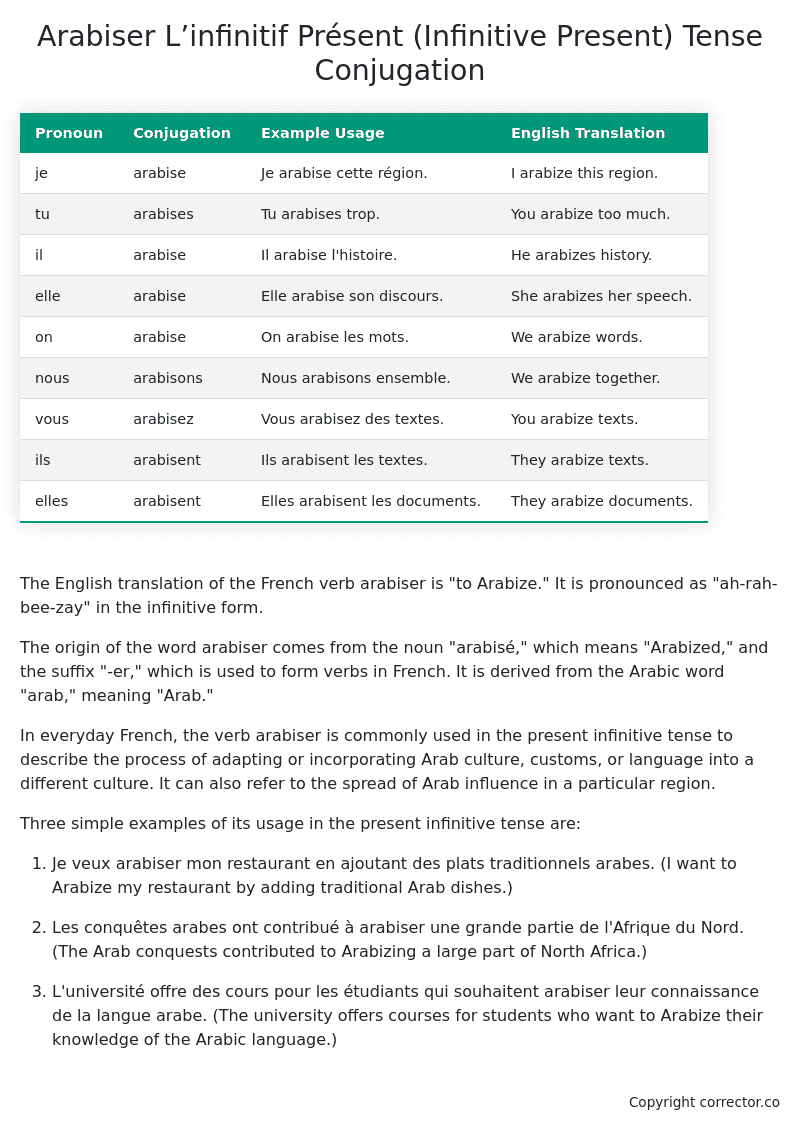L’infinitif Présent (Infinitive Present) Tense Conjugation of the French Verb arabiser
Introduction to the verb arabiser
The English translation of the French verb arabiser is “to Arabize.” It is pronounced as “ah-rah-bee-zay” in the infinitive form.
The origin of the word arabiser comes from the noun “arabisé,” which means “Arabized,” and the suffix “-er,” which is used to form verbs in French. It is derived from the Arabic word “arab,” meaning “Arab.”
In everyday French, the verb arabiser is commonly used in the present infinitive tense to describe the process of adapting or incorporating Arab culture, customs, or language into a different culture. It can also refer to the spread of Arab influence in a particular region.
Three simple examples of its usage in the present infinitive tense are:
-
Je veux arabiser mon restaurant en ajoutant des plats traditionnels arabes. (I want to Arabize my restaurant by adding traditional Arab dishes.)
-
Les conquêtes arabes ont contribué à arabiser une grande partie de l’Afrique du Nord. (The Arab conquests contributed to Arabizing a large part of North Africa.)
-
L’université offre des cours pour les étudiants qui souhaitent arabiser leur connaissance de la langue arabe. (The university offers courses for students who want to Arabize their knowledge of the Arabic language.)
Table of the L’infinitif Présent (Infinitive Present) Tense Conjugation of arabiser
| Pronoun | Conjugation | Example Usage | English Translation |
|---|---|---|---|
| je | arabise | Je arabise cette région. | I arabize this region. |
| tu | arabises | Tu arabises trop. | You arabize too much. |
| il | arabise | Il arabise l’histoire. | He arabizes history. |
| elle | arabise | Elle arabise son discours. | She arabizes her speech. |
| on | arabise | On arabise les mots. | We arabize words. |
| nous | arabisons | Nous arabisons ensemble. | We arabize together. |
| vous | arabisez | Vous arabisez des textes. | You arabize texts. |
| ils | arabisent | Ils arabisent les textes. | They arabize texts. |
| elles | arabisent | Elles arabisent les documents. | They arabize documents. |
Other Conjugations for Arabiser.
Le Present (Present Tense) Conjugation of the French Verb arabiser
Imparfait (Imperfect) Tense Conjugation of the French Verb arabiser
Passé Simple (Simple Past) Tense Conjugation of the French Verb arabiser
Passé Composé (Present Perfect) Tense Conjugation of the French Verb arabiser
Futur Simple (Simple Future) Tense Conjugation of the French Verb arabiser
Futur Proche (Near Future) Tense Conjugation of the French Verb arabiser
Plus-que-parfait (Pluperfect) Tense Conjugation of the French Verb arabiser
Passé Antérieur (Past Anterior) Tense Conjugation of the French Verb arabiser
Futur Antérieur (Future Anterior) Tense Conjugation of the French Verb arabiser
Subjonctif Présent (Subjunctive Present) Tense Conjugation of the French Verb arabiser
Subjonctif Passé (Subjunctive Past) Tense Conjugation of the French Verb arabiser
Subjonctif Imparfait (Subjunctive Imperfect) Tense Conjugation of the French Verb arabiser
Subjonctif Plus-que-parfait (Subjunctive Pluperfect) Tense Conjugation of the French Verb arabiser
Conditionnel Présent (Conditional Present) Tense Conjugation of the French Verb arabiser
Conditionnel Passé (Conditional Past) Tense Conjugation of the French Verb arabiser
L’impératif Présent (Imperative Present) Tense Conjugation of the French Verb arabiser
L’infinitif Présent (Infinitive Present) Tense Conjugation of the French Verb arabiser (this article)
Struggling with French verbs or the language in general? Why not use our free French Grammar Checker – no registration required!
Get a FREE Download Study Sheet of this Conjugation 🔥
Simply right click the image below, click “save image” and get your free reference for the arabiser L’infinitif Présent tense conjugation!

Arabiser – About the French L’infinitif Présent (Infinitive Present) Tense
Forming the Infinitive Present
Common Everyday Usage Patterns
As a Verb’s Dictionary Form
After Modal Verbs
As an Imperative
In Infinitive Clauses
Interactions with Other Tenses
Present Tense
Future Tense
Conditional Tense
Passé Composé
Imperfect Tense
Subjunctive and Conditional Moods
Summary
Want More?
I hope you enjoyed this article on the verb arabiser. Still in a learning mood? Check out another TOTALLY random French verb conjugation!


